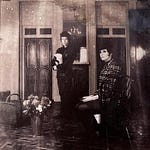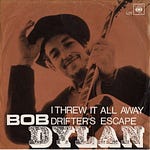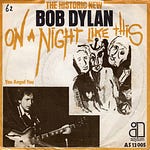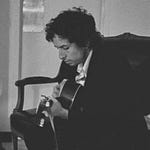Welcome to November and welcome to Sign on the Window. This week, we're talking 1963's "Paths of Victory," officially released in the Bootleg Series Vol. 1-3 and Vol. 9.
SHOW NOTES
CONTEXT (3:00)
The lyrics for “Paths of Victory” were first published in *Broadside* No. 17 and recorded during a session with them. We listened to the August 12, 1963 Studio A take (intended to be on the The Times They Are A-Changin') and the December ’63 Witmark demo.
“PALMS OF VICTORY” & PILGRIM’S PROGRESS (7:00)
Of course, Kelly explains, before there were “Paths of Victory,” there were “Palms of Victory.” Also known as “Deliverance Will Come” and “The Way-worn Traveler,” it is believed to have been written in 1836 by Rev. John B. Mattihas, a Methodist Episcopal minister in New York. Though not well-documented and Mattihas has no history of writing songs or hymnals, the citation stuck.
The song is a play on the palm branch, a symbol of victory, triumph, peace and eternal life dating back the ancient Near East and Mediterranean world. It was then adopted by the Big 3: Christianity, Judaism, and Islam.
Pilgrim’s Progress is a Christian allegory written in 1678 by John Bunyan. Cited as one of the first novels in English, it centers around the journey from the “City of Destruction” to the “Celestial City.” In addition to “Paths of Victory” being influenced, there’s also works by Thackeray, Twain, e.e. cummings, Nathaniel Hawthorne, Steinbeck, and Vonnegut (Billy Pilgrim in Slaughterhouse Five is more than just a wink and a nod!).
Daniel also has some 1678 facts that need to be heard to be believed. (Not really.) (It’s mostly just Catholic Church shenanigans.)
SONG ITSELF (22:00)
The song not being included on Times They Are A-Changin’ makes complete sense when you realize this song is “Times They Are A-Changin'” in 3/4 and on piano. It’s also a religious song that Dylan makes secular, makes political. It also doesn’t pander to the audience like religious songs are wont to do, Dylan creates a challenging song that nourishes the believer in change. That’s why Dylan’s religious period is so hard to swallow still: when nuance is lost of inevitability than fighting for change is obsolete.
As for the mechanics, Kelly was happy with a chorus (of sorts) for DAYS. The Witmark demos are slower and, significantly, change the lyrics from “we” to “I,” which we couldn’t decide on how we felt. The Times recording is fine, the piano sounds good but, as Tony Attwood notes, “Bass note / chord / bass note / chord and so on ad infinitum.”
THE EPISODE’S BOOKLET & PLAYLIST
RECOMMENDATIONS (31:00)
Kelly watched Stranger Things 2 and played the videogame Gone Home.
Daniel listened to Slaughter Beach, Dog Birdie, Gordon Downie (who just passed away), Julien Baker Turn Out the Lights and Ken Burn’s Vietnam.
ENDINGS
Kelly guessed #236, "If You Ever Go to Houston" (which would have worked well as the Astros just won the World Series). It’s #472, "Lenny Bruce" off Shot of Love (our first from the album).
Next week: Lenny Bruce is dead...
Follow us wherever you listen to podcasts. See our real-time playlist See That My Playlist is Kept Clean on Spotify. Follow us intermittently on Twitter and Instagram.
Tell your friends about the show, rate and review wherever they let you, and consider supporting us by subscribing or at Patreon.














Share this post